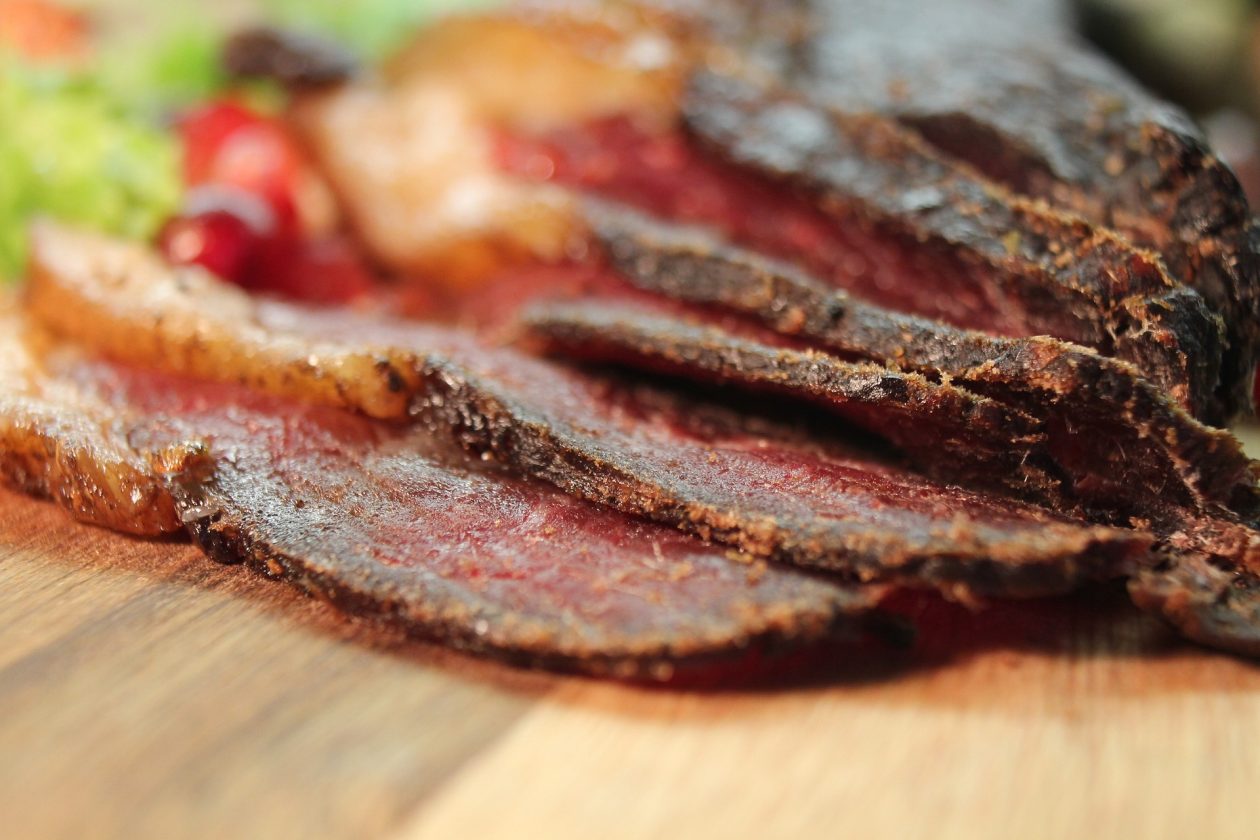Introduction
The ketogenic diet has gained a lot of interest in recent years due to its claims to help with weight loss and metabolic health. This high-fat, low-carb eating strategy has drawn people looking for sensible methods to control their weight and improve their health. Beef jerky is one of the most practical and high-protein keto snack options available to anyone following this diet.
Beef jerky has a long shelf life and is portable, making it an excellent option for people on the road who want to satiate their hunger without straying from their ketogenic diet. The relevance of knowing whether beef jerky is compatible with the keto diet is growing as more people experiment with it. Let’s examine the nutritional makeup of beef jerky in more detail and how it affects people on a ketogenic diet.
Understanding the Keto Diet
The keto diet, also known as the ketogenic diet, is a low-carb, moderate-protein, high-fat eating plan that tries to put the body into a state of ketosis. When the body uses fat for energy rather than carbs, it enters a state known as ketosis and produces ketones as a byproduct. This metabolic state can help with weight loss, increased energy, and improved mental clarity, among other health benefits. The keto diet’s primary goal is to force the body to rely solely on fats for energy by severely reducing carbohydrate intake, usually to fewer than 50 grams daily.
The goal of the keto diet is to change the body’s metabolism so that burning fat for fuel takes precedence over carbohydrate ingestion, which is the body’s primary energy source. Consuming foods high in healthy fats, such as avocados, nuts, seeds, and oils, and limiting or avoiding foods high in carbohydrates, such as grains, fruits, starchy vegetables, and sugar, are standard components of this dietary strategy.
The nutritional makeup and carbohydrate content of beef jerky determine its compatibility with the ketogenic diet. Even though beef jerky is a snack that appeals to people on low-carb diets like the ketogenic diet since it is naturally high in protein and low in carbohydrates, there are a few things to keep in mind. Commercial beef jerky products sometimes have artificial preservatives, flavorings, and added sugars that might increase carbohydrate intake and interfere with ketosis. As a result, those who carefully follow the ketogenic diet should choose beef jerky that is little processed and devoid of additional sugars or carbohydrates.
Furthermore, monitoring portion sizes and being aware of total macronutrient intake is critical to ensure beef jerky is within the ketogenic diet’s guidelines. Consumers can enjoy this tasty snack without violating their dietary goals by selecting premium beef jerky products and carefully including them in a well-rounded keto meal plan.
Nutritional Composition of Beef Jerky

Knowing the nutritional makeup of beef jerky is crucial for determining whether or not it fits within a ketogenic diet. Because of its high protein content, beef jerky is highly valued and a great snack choice for anyone trying to get enough protein daily. Depending on the brand and manner of production, each ounce of beef jerky usually contains 7–10 grams of protein. Because of its high protein content, which aids in muscle maintenance and repair, beef jerky is a favorite among athletes and people on high-protein diets.
Beef jerky is well-known for having a low carbohydrate profile and high protein content, which might benefit people following a ketogenic diet. Most beef jerky types have few carbohydrates; some goods have fewer than 5 grams per serving. Because of its low-carb content, beef jerky is an excellent choice for people who want to reduce their carbs and enter ketosis—a metabolic condition linked to the keto diet.
But it’s essential to pay close attention to the ingredient list because certain commercially available beef jerky products could have preservatives or additional sugars, which raise the carb count. Choosing sugar-free beef jerky that has undergone minimum processing can assist in guaranteeing keto diet compatibility and efficiently meeting dietary objectives.
While beef jerky may be a good snack for keto dieters due to its high protein and low carbohydrate content, it’s essential to consider other aspects like product quality and potential health hazards. Certain beef jerky items could have artificial flavors, colors, or added preservatives, which goes against clean eating or good health. Furthermore, consuming processed meats like beef jerky in excess has been linked to a higher risk of developing certain illnesses, such as cancer and heart disease.
A moderate and careful selection of premium beef jerky options is advised to optimize its advantages while reducing potential hazards. People can enjoy this savory snack as part of a balanced approach to nutrition and health by intelligently adding it into a well-rounded keto meal plan and emphasizing moderation and quality.
Compatibility with the Keto Diet

A careful analysis of the nutritional profile of beef jerky is necessary to determine whether it is appropriate for people on a ketogenic diet. Although many people who follow a ketogenic diet find that beef jerky has a high protein content, it’s essential to pay close attention to how many carbohydrates it contains. When the body uses fat as its primary fuel to enter and stay in ketosis, the keto diet strongly emphasizes consuming little to no carbohydrates.
As a result, those following this dietary strategy need to watch how many carbohydrates they eat because even small amounts can throw off their ketosis. Prioritizing beef jerky with low carbs is crucial for a ketogenic diet. Beef jerky without added sugar or preservatives can guarantee that it stays an acceptable snack option for keto.
When incorporating beef jerky items into a keto diet plan, it’s essential to pay attention to the overall quality of the product as well as to the amount of carbohydrates consumed. Certain commercial beef jerky brands could include sugars, fillers, or additives that make them less suitable for the ketogenic diet.
As a result, discriminating customers should look for superior beef jerky selections devoid of needless additives and prepared from top cuts of beef. People can enjoy this tasty snack while adhering to their nutritional goals by choosing irregular beef items that follow the keto diet’s core principles, which include high protein, low carbohydrate, and minimal additives. Ultimately, maximizing the compatibility of beef jerky with a keto lifestyle may be achieved by making educated decisions and placing a high value on quality. This will provide a quick and filling snack alternative for those following this dietary plan.
Benefits of Beef Jerky on Keto

For those following the ketogenic diet, beef jerky presents a compelling alternative for a snack that is both portable and compliant with the nutritional guidelines of this eating plan. Its robustness and small design make it perfect for consumption when on the go, meeting the demands of hectic schedules without sacrificing nutritious value. Beef jerky also stands out for having a high protein level, essential for maintaining muscle mass and encouraging satiety.
This is especially true for people on a high-fat, low-carb diet like the ketogenic diet. Beef jerky offers a filling and high-protein snack substitute that can assist people following the ketogenic diet to meet their macronutrient targets and prevent hunger between meals.
In the context of the keto diet, beef jerky’s shallow carbohydrate content is one of its best qualities. In contrast to many other snack alternatives high in carbohydrates, beef jerky usually has few or no carbohydrates, making it a desirable option for people trying to cut back on their carb intake to enter or stay in a state of ketosis. Because it doesn’t include any carbohydrates, beef jerky is a healthy and adaptable snack that won’t raise blood sugar or interfere with the generation of ketones.
As a result, beef jerky provides followers of the ketogenic lifestyle with a guilt-free, filling snack that helps them achieve their nutritional objectives and encourages general adherence to the lifestyle’s tenets.
Additionally, beef jerky’s extended shelf life and low prep needs add to its allure as a keto-friendly snack. Because of its robustness, people can store and stockpile it for extended periods, knowing they will always have an option available when hunger hits. Furthermore, the lack of refrigeration or heating requirements reduces its consumption, making it convenient to drink in various environments, including the workplace, outdoor activities, and travel. These characteristics add to the beef jerky’s adaptability and ease of use as a go-to snack for people dedicated to staying in ketosis and getting the most nutrition possible while following a ketogenic diet.
Potential Drawbacks
For people who are on the ketogenic diet, beef jerky can be a tasty and practical snack choice, but there are a few possible risks involved with its use. One significant issue is the high salt content that commercial beef jerky products frequently include. Overconsumption of sodium can cause bloating, elevated blood pressure, and other adverse health effects, especially in those who are sensitive to the mineral or have specific medical disorders. To reduce sodium intake, it is therefore advised to read the nutrition label, choose beef jerky variants with lower sodium levels, or think about preparing handmade versions using lean beef cuts and little flavor.
The substantial protein level of beef jerky is another factor to consider. This could present difficulties for anyone trying to follow the ketogenic diet, particularly regarding macronutrient balance. Although protein is necessary to maintain muscle mass and general health, too much protein can interfere with ketosis by converting to glucose via a process known as gluconeogenesis. It’s critical to control portion sizes, add additional fat sources, and include low-carbohydrate items to preserve the appropriate macronutrient ratio to reduce this risk.
Additionally, for individualized advice on including beef jerky in a ketogenic meal plan while addressing potential concerns with protein overconsumption, anyone with specific dietary goals or health concerns should speak with a healthcare provider or registered dietitian.
Is Beef Jerky Keto Friendly?
A. Short Answer: Yes, beef jerky can be keto-friendly as it is typically low in carbohydrates and protein, making it suitable for individuals following a ketogenic diet.
B. In-Depth Analysis: Beef jerky can be a convenient and satisfying snack option for those following the keto diet due to its macronutrient profile. It is typically low in carbohydrates, with most varieties containing only trace amounts of carbs per serving, making it compatible with the low-carb requirements of the keto diet. Additionally, beef jerky is high in protein, essential for muscle maintenance and satiety.
However, it’s necessary to be mindful of the quality of the beef jerky consumed. Commercial varieties may contain added sugars, preservatives, or flavorings that could impact ketosis or overall health. Opting for minimally processed beef jerky made from high-quality ingredients can help ensure it aligns with keto dietary guidelines.
In summary, beef jerky can be a keto-friendly snack option for individuals following a ketogenic diet, thanks to its low carbohydrate and high protein content. However, it’s essential to choose varieties with minimal additives and to consume them in moderation as part of a balanced diet. By selecting high-quality beef jerky products and being mindful of portion sizes, individuals can enjoy this convenient snack while staying within their keto macros.
FAQ about Beef Jerky
Q: Is beef jerky high in carbs?
A: While beef jerky is an excellent source of lean protein, some flavors may contain added ingredients like honey, sugar, or soy sauce, contributing to a relatively high carb content per serving.
Q: Is beef jerky OK for keto?
A: Beef jerky can be suitable for a keto diet, especially varieties with minimal carbohydrates and additives. Opting for sugar-free or low-carb options can help ensure they align with keto dietary guidelines.
Q: Can Muslims eat beef jerky?
A: Traditional beef jerky sourced from a halal animal and made with only salt (a halal ingredient) is generally considered halal. However, commercial varieties may contain additional ingredients and additives, so checking the label for compliance with halal dietary laws is essential.
Q: Is beef jerky junk food?
A: Beef jerky can be a nutritious snack option when made from high-quality ingredients and consumed in moderation. However, some commercial varieties may contain added sugars, preservatives, or high sodium levels, contributing to their classification as less healthy options.
Q: Is beef jerky healthier than chips?
A: Beef jerky can be a healthier alternative to chips as it is typically lower in carbohydrates and higher in protein. However, it’s essential to consider factors such as sodium content and additives when comparing their overall healthiness.
Q: Why is beef jerky so expensive?
A: Making beef jerky involves dehydration, reducing the moisture content, and increasing flavor concentration. Additionally, high-quality beef and minimal processing contribute to the higher cost than other snacks.
Conclusion
In conclusion, beef jerky can be keto-friendly depending on the ingredients used in its preparation. Because of its high protein content and low carbohydrate profile, beef jerky is a practical snack choice for people on a ketogenic diet. Still, it’s essential to check the ingredient list carefully. Certain types of beef jerky could have additional sugars or carbohydrates, which could interfere with ketosis. For this reason, those following a ketogenic diet should choose low-carb or sugar-free beef jerky varieties to ensure they fit in with their diet.
Moreover, adding beef jerky to a ketogenic diet requires moderation. Like with other products, consuming too much beef jerky can have unforeseen repercussions, even if it might be a convenient and satisfying snack. It’s also essential to read product labels carefully to avoid any additives or hidden sugars that could undermine ketosis. People can still get the nutritional benefits of beef jerky as part of a balanced keto diet without sacrificing their health objectives if they choose premium, low-carb varieties and are aware of portion amounts.
Reference:
(1) Diet Review: Ketogenic Diet for Weight Loss
https://www.hsph.harvard.edu/nutritionsource/healthy-weight/diet-reviews/ketogenic-diet/
(2)Is Beef Jerky Good for You? – Nutrition
https://www.healthline.com/nutrition/is-beef-jerky-good-for-you
(3) IS BEEF JERKY GLUTEN-FREE?
https://peopleschoicebeefjerky.com/blogs/news/is-beef-jerky-gluten-free
(4) Healthy Beef Jerky: The 10 Best Low-Sodium, Low-Sugar Jerky Brands
https://www.mensjournal.com/health-fitness/healthiest-low-sodium-low-sugar-jerky-brands/
Was this helpful?

Joseph Emb, RDN
Founder of StyleVitally.com | Registered Dietitian & Wellness Advocate
What I Cover:
I’m passionate about connecting nutrition science and everyday wellness to help people live healthier, more vibrant lives. I write about evidence-based nutrition, mindful eating, sustainable lifestyles, and holistic well-being at StyleVitally.com.
My Background:
The University of Texas in Austin, where I earned my Dietetics diploma, laid the groundwork for my nutrition and health career. My training and hands-on experience taught me the science and art of using nutrition to enhance health and well-being.
Professional Journey:
I’m an RDN with lots of experience. I’ve helped people seeking tailored nutritional recommendations in clinical settings and community outreach programs. My constant learning and professional development ensure that my recommendations are always based on the latest evidence.
Ethical Commitment:
My practice prioritizes integrity. My content is transparent and objective, following the most significant ethical standards. I can give my audience unbiased advice because I’m not affiliated with food businesses or industry associations. I want to help people make informed health decisions that match their values and ambitions.
Join Me on the Wellness Journey:
Join me on the path to vitality and well-being, whether facing nutritional issues, seeking sustainable lifestyle changes, or simply wanting a better, happier you. We’ll discover how diet, mindfulness, and holistic well-being can maximize your potential.










Leave a Reply
View Comments